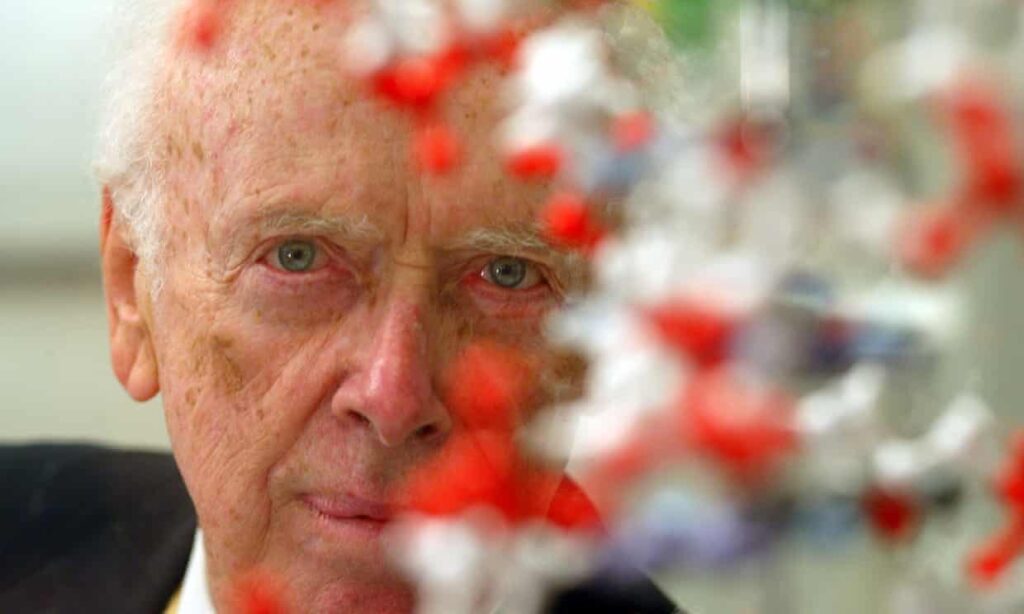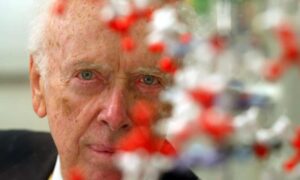
James Watson, the co-discoverer of the structure of DNA and a prominent figure in the field of molecular biology, has died at the age of 97. His groundbreaking work, shared with Francis Crick in 1953, not only transformed scientific understanding but also sparked widespread debate due to Watson’s often controversial views and strong personality.
Watson and Crick’s discovery of the double helix structure of DNA at Cambridge University marked a milestone in the 20th century. The model revealed how DNA carries genetic information, fundamentally altering the fields of biology, medicine, and genetics. Their research underscored the chemical basis of inheritance, providing new avenues for exploration in evolutionary and medical sciences.
On February 28, 1953, Watson recounted in his memoir, The Double Helix, the moment Crick entered the Eagle pub in Cambridge, exclaiming, “We have discovered the secret of life.” This statement followed their successful elucidation of DNA’s structure, a breakthrough that would later earn them the Nobel Prize in Physiology or Medicine in 1962, alongside biophysicist Maurice Wilkins.
Early Years and Academic Journey
Born on April 6, 1928, in Chicago, Watson exhibited academic brilliance from an early age. By 15, he enrolled at the University of Chicago to study zoology, later shifting his focus to genetics under the mentorship of Hermann Muller. Watson’s early career was characterized by a keen ambition to challenge established scientific norms, particularly the prevailing view that genes were made of proteins rather than nucleic acids.
In 1951, Watson’s pursuit of DNA structure brought him to the Cavendish Laboratory in Cambridge, where he met Crick. Their contrasting personalities—Watson’s boldness and Crick’s measured intellect—formed a potent partnership that propelled their research forward. Utilizing X-ray diffraction data, they crafted models that ultimately led to the double helix discovery.
The duo’s work was not without controversy. Watson’s memoir portrayed their journey as an adventurous race against time, often dismissing the contributions of peers, which stirred resentment in the scientific community. His candid accounts included unflattering remarks about fellow scientists, reflecting a mix of hubris and ambition that defined his character.
Legacy and Controversies
After their Nobel win, Watson held various prominent positions, including a senior research fellow at the California Institute of Technology and later, a significant role at the Cold Spring Harbor Laboratory, where he served as director. Under his leadership, Cold Spring Harbor became a leading institution for cancer research and DNA science, drawing thousands of scientists annually for its advanced courses and meetings.
Watson’s influence extended to major projects such as the Human Genome Project, aimed at sequencing the entire human genome. He advocated for transparency in genetic research and emphasized the importance of addressing ethical implications associated with genetic discoveries. His commitment to open publication helped shape the future of genetics.
Despite his scientific achievements, Watson’s career was marred by several controversies. His comments on race and intelligence, particularly his assertion about inherent differences in intelligence among races, drew widespread condemnation. Following these remarks in 2007, he faced backlash that led to the revocation of his honorary titles at Cold Spring Harbor and a tarnished public image.
In 2014, Watson sold his Nobel medal for $4.1 million, stating financial difficulties stemming from his controversial position. His attempts to return to public life were met with further controversy when he reiterated his previous views in a documentary in 2019, prompting renewed criticism from the scientific community and the public alike.
Watson’s legacy is complex. While he made monumental contributions to science, his controversial views and the fallout from his statements overshadowed many of his achievements. He is survived by his wife, Elizabeth, their two sons, and a grandson.
James Dewey Watson, a figure who changed the landscape of biological sciences, passed away on November 6, 2025, leaving behind a mixed legacy of scientific brilliance and contentious public discourse.







